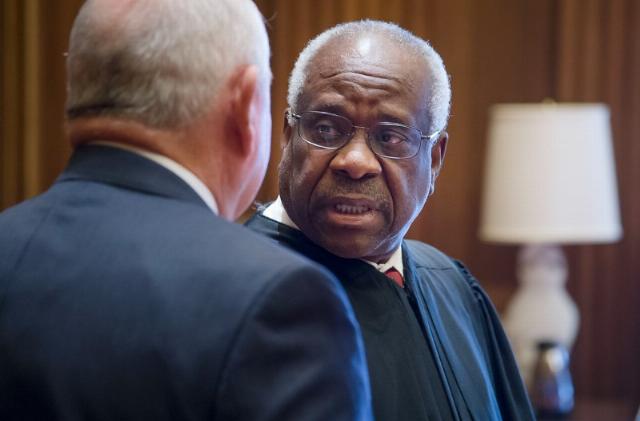A swing and a miss from Clarence Thomas
Our nation’s founding documents, the Declaration of Independence, the Constitution, and the Bill of Rights, established a government entity with one purpose: to protect the rights of the individual citizen. It did so by limiting the ability of our government to exercise unwarranted power over any citizen, including private business, which, under individual right to ownership, is an extension of a citizen.
The issue of funding the Consumer Financial Protection Bureau goes so much deeper than an “appropriations” argument. The real issue is how much control, power, and taxpayer funding is appropriate for an y of the administrative branch.
The deeper discussion is, who will oversee any federal agency in order to protect the rights of the citizen? And therefore, how much power should any bureaucracy have? This issue goes to the heart of our nation.
The true intent of the “Appropriations Clause” is to codify the law that no federal agent can issue fines, taxes, appropriations of any kind without the ability of the citizen to fire that person in an election. Herein lies the one “democratic” principle in our republic: all politicians with taxing authority must stand before the citizens on a regular basis so that if that congressmen or president abuses the power of government, he can be removed from office.
When Senator Elizabeth Warren created the CFBP, she deliberately placed the agency under the Federal Reserve so that it was not subject to congressional oversight, as clearly required in the Constitution and Articles. Warren’s deliberate act was intended to eliminate the founding principle of accountability. It is and was unconstitutional.
At the deepest level, this discussion is about protection of the individual from an excess of government control. Many politicians and most bureaucrats believe that government, federal agency, and bureaucracy are the correct answer to all our problems.
The vast majority of free citizens absolutely disagree. We believe, as the nation’s founding documents so clearly state, that government must be severely limited so that it doesn’t grow unconditionally. Since we citizens pay for that government, through taxation and federal debt, we will have our say.
The Constitution and Articles establish significant boundaries for federal action. The CFPB, and Congress, and now the SCOTUS have weakened those federal guiderails significantly. Pray that Justice Thomas re-examine the real issue before him.
Jay Davidson is founder and CEO of a commercial bank. He is a student of the Austrian School of Economics and a dedicated capitalist. He believes there is a direct connection joining individual right and responsibility, our Constitution, capitalism, and the intent of our Creator.

Image: Clarence Thomas. Credit: Flickr, public domain.
FOLLOW US ON
Recent Articles
- Trump’s First 100 Days: A Scorecard of Wins, Waits, and Wobbles
- Larry David: No Longer the Master of his Comedic Domain
- Mass deportations without ICE enforcement
- Harvard’s Tax-Exempt Status and Religion-Based Bequests
- The Net Neutrality Hydra: Twice Decapitated, Still Standing
- Cloward-Piven and the Migrant Invasion
- Acting on the Lessons of History
- Is Jamie Raskin Having a Psychotic Break?
- Mother or Monster?
- Donald Trump: Right Man, Right Moment
Blog Posts
- Ugly details rolling out on just what the Milwaukee judge did hands hyperventilating Democrats another losing cause
- Maybe woke has been "berry berry bad" to me?
- How much due process is due illegals?
- No Tesla or victim love in Minneapolis
- This is what happens when you tell people the law doesn’t apply to them
- As predicted, AOC is clearly running for president
- The big surprise about that judge arrested for allegedly helping an illegal alien escape from ICE
- Multiculturalism’s Marxist roots
- Washington State’s racist policies and infanticide dreams
- The jig is up! Newsom busted for blowing state Medicaid dollars on homeless housing
- What a shame to see Elon Musk returning to the private sector
- The almost-terrorist attack you didn’t hear about
- Trump’s unleashing of American energy is kneecapping China...and might just save Europe
- With Trump's agenda in peril, America is in peril
- How Republicans can score an immigration victory






